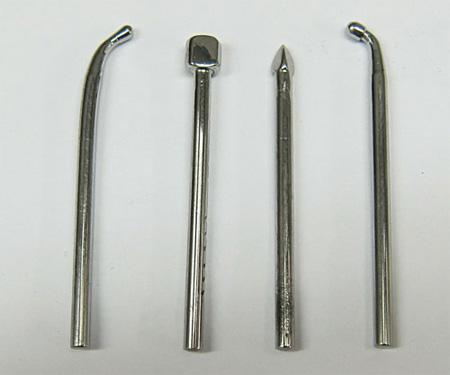Online Jewelry Training Classes for Metalsmiths



Rotary Burnishing Tools are used in various metalsmithing applications to smooth out and cover up porosity holes in metal.
These burnishing tools are used and form part of the Making Fused Jewelry Tutorial which is an in depth technical tutorial consisting of 47 pages and over 80 pictures, showing three different projects and various methods of setting stones in fused metal and fused component manufacture.
This free tutorial follows the same format as all my other free and premium tutorials. This gives you a good insight into the technical teaching methodology
I start with an old 3 mm ball frazer for this one.
I rough shape it on a bench grinder, just to get most of the teeth off.
Once it is rough shaped it needs to be smoothed out a bit more.
I sand the ball tip further with a 220 and 1200 grit buff stick whilst it is spinning in my hanging motor.
Once the ball is smoothed out to 1200 grit, I bend it to just under 90º using my torch.
I use my steel block and then heat the tip cherry red.
It looks hotter than it really is, and also it doesn't heat the steel block at all.
With soft pressure and as the tip heats up it bends slowly.
This is the angle that I have found to be the easiest to use.
Looks terrible, but it's easy to fix up.
I use a 1200 grit sanding mandrel to remove the fire scale, which isn't very thick.
And then I use a normal polishing buff on my polishing motor to shine it up.
These are the four different rotary burnishers that I use most often.
Generally spoken, burrs are made of high speed steel. These are heat hardened and then tempered for general use.
When the burr is shaped and bent, the temper is removed, effectively making the metal softer.
With the next shape I make I will also show how to restore the hardness to a burnisher.
With this shape there is a little more work to do to obtain the desired shape.
First I rough shape it on the bench grinder.
This time I first heat the front of the burr bright orange and then allow it to air cool.
This will bring the metal to a hardness that will allow it to be filed with a normal file.
Then I file two flat sides on it and gently round all the corners with 220 and 1200 grit sand paper.
Then I polish it on my polishing machine.
Now, as with the round tip burnisher above and the three sided burnisher, they have to be re hardened.
For sure one could use them as they are, because the high speed steel is harder than gold or silver. So if they were to get marred, all that has to be done is to polish them up again.
But it is just better to make them hard again.
An egg cup filled with engine oil is all that is needed.
The burnisher is heated to bright yellow like in the picture.
Then it is quenched in the oil until it is cooled down.
The tip is covered in scale when it comes out of the oil.
It is easily removed with your 1200 grit buff stick and then polished on the polishing motor..
Finished, hardened and ready for use.
I made sure all the corners have soft curves.
This one was also made from a 6 mm ball frazer and ground into a three sided shape on the bench grinder.
Then it was also finished with buff sticks and polished on a polishing motor.
It is then hardened as well.
This shape is handy for getting in narrow spaces.
This is the basic shape, and you can imagine that were it spinning very fast, it would move the metal forward quite nicely.
By moving metal forward, I mean moving it forward to close any holes and pits that make up porosity.
This is a commercially made burnisher. They are costly and they are big and clumsy.
I seldom use them.
A close up showing the smoothed out burnishing head.
Here is a before and after comparison of some 14 kt gold with quite a lot of porosity .
I used the round tip rotary burnisher here.
As can be seen, there is a substantial improvement.
Click the link to receive your free PDF version of making your own Rotary Burnishing Tools, which will be emailed to you within 4 - 12 hours.
or select other projects from Jewelry Making Tutorials List
If you have any questions or wish to be notified of any new tutorials that are posted, email me.
This content is the intellectual property of Hans Meevis. More information on our Copyright and Privacy Policy